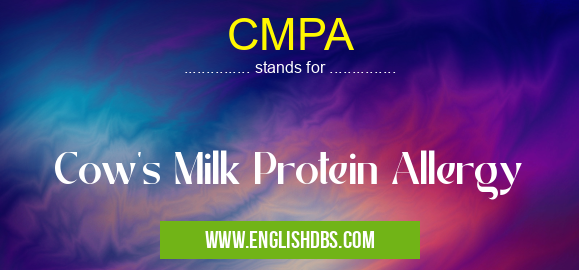What does CMPA mean in CLINICAL MEDICINE
CMPA or Cow's Milk Protein Allergy is an allergic reaction caused by the immune system's response to proteins found in cow's milk. It is a common food allergy in infants and young children, affecting approximately 2-3% of the population.

CMPA meaning in Clinical Medicine in Medical
CMPA mostly used in an acronym Clinical Medicine in Category Medical that means Cow's Milk Protein Allergy
Shorthand: CMPA,
Full Form: Cow's Milk Protein Allergy
For more information of "Cow's Milk Protein Allergy", see the section below.
Symptoms
CMPA can manifest in various ways, including:
- Digestive issues: vomiting, diarrhea, colic, gas, and bloating
- Skin reactions: eczema, hives, or rashes
- Respiratory problems: wheezing, coughing, or shortness of breath
- General discomfort: fussiness, irritability, or difficulty sleeping
Diagnosis
Diagnosing CMPA typically involves a combination of medical history, physical examination, and food allergy testing. A food challenge, where the child is given small amounts of cow's milk under controlled conditions, may also be conducted.
Management
The primary management strategy for CMPA is strict avoidance of all cow's milk products. This includes milk, cheese, yogurt, butter, and any other foods that may contain hidden cow's milk proteins.
- Breastfeeding: If possible, breastfeeding is recommended for infants with CMPA. Human milk does not contain the proteins that cause the allergy.
- Hypoallergenic formula: For formula-fed infants, a hypoallergenic formula that is free of cow's milk protein can be used.
- Food avoidance: Careful reading of food labels is crucial for individuals with CMPA. Many processed foods may contain hidden cow's milk proteins.
Essential Questions and Answers on Cow's Milk Protein Allergy in "MEDICAL»CLINICAL"
What is Cow's Milk Protein Allergy (CMPA)?
CMPA is an immune system reaction to the proteins found in cow's milk. It is the most common food allergy in infants and young children, affecting up to 2-3% of babies under one year of age.
What are the symptoms of CMPA?
Symptoms of CMPA can vary, but common signs include:
- Skin reactions: eczema, hives, swelling, or redness
- Digestive issues: vomiting, diarrhea, constipation, colic
- Respiratory problems: wheezing, coughing, shortness of breath
- General symptoms: fussiness, irritability, poor growth
How is CMPA diagnosed?
CMPA diagnosis involves a combination of:
- Medical history and physical examination
- Elimination diet: removing cow's milk from the child's diet and observing for improvement
- Skin prick or blood test: to detect antibodies against cow's milk proteins
What is the treatment for CMPA?
The primary treatment for CMPA is dietary avoidance:
- Breastfeeding mothers should avoid consuming cow's milk and dairy products
- Formula-fed infants should be switched to a hypoallergenic formula, such as soy-based or extensively hydrolyzed formulas
- Children over one year old should eliminate all cow's milk and dairy products from their diet
How long does CMPA typically last?
The duration of CMPA varies, but it typically resolves within 1-2 years of age. However, some individuals may continue to experience symptoms into adulthood.
What are the long-term effects of CMPA?
Most children with CMPA outgrow the allergy and do not experience any long-term effects. However, in rare cases, CMPA can lead to:
- Delayed growth
- Malnutrition
- Increased risk of other allergies
Is there a cure for CMPA?
Currently, there is no cure for CMPA. However, dietary avoidance and management can effectively control symptoms and prevent complications.
Final Words: CMPA is a common food allergy that can cause a range of symptoms in infants and young children. Early diagnosis and strict avoidance of cow's milk products are essential for managing this condition effectively. By understanding the CMPA meaning and following appropriate dietary measures, individuals can minimize the impact of this allergy on their health and well-being.
CMPA also stands for: |
|
| All stands for CMPA |
